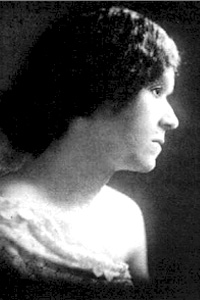
Don't knock at my door, little child,
I cannot let you in,
You know not what a world this is
Of cruelty and sin.
Wait in the still eternity
Until I come to you,
The world is cruel, cruel, child,
I cannot let you in!
Don't knock at my heart, little one,
I cannot bear the pain
Of turning deaf-ear to your call
Time and time again!
You do not know the monster men
Inhabiting the earth,
Be still, be still, my precious child,
I must not give you birth!
http://voices.cla.umn.edu/artistpages/johnsonGeorgia.php
http://www.english.illinois.edu/maps/poets/g_l/douglas-johnson/life.htm
I cannot let you in,
You know not what a world this is
Of cruelty and sin.
Wait in the still eternity
Until I come to you,
The world is cruel, cruel, child,
I cannot let you in!
Don't knock at my heart, little one,
I cannot bear the pain
Of turning deaf-ear to your call
Time and time again!
You do not know the monster men
Inhabiting the earth,
Be still, be still, my precious child,
I must not give you birth!
After graduation from Atlanta University, Georgia Douglas Johnston moved with her husband, a lawyer and civil employee, to Washington DC where she lived for over 50 years. However, her husband died in 1925 and left Johnson to face a life full of challenges as not only a widowed, single mother of two, but also a black woman, struggling to make it as a writer. However, her writing caught the attention of many and despite her geographic separation from the major literary circles of the time in Harlem, she was still able to become one of the most famous female poets of the Harlem Renaissance.
Her poetry and other writings reflect the hardships she faced in her life as well as those experienced by her peers. Her poem, “Black Woman,” Johnson expresses the pain experienced as a black woman in society and her reluctance to bring a child into that “cruel” world. This poem is deeply emotional as the speaker is torn between the love of her child who she longs to be with and the need to protect him or her from the harsh realities and “monster men” that are an inevitable part of negro life. She goes so far as to beg for her unborn child to “be still.” This is a morbid wish that conveys the only the deep torment of these contradicting desires. She believes that she is protecting him or her because sometimes it is better to have never been born at all than experience the agony of life’s trials and tribulations.
Johnson utilizes poetic techniques such as rhyming as in “birth” and “earth” as well as repetition and alliteration as in “cruel, cruel, child” and along with a fairly steady structure that is broken only on occasion for emphasis. These elements combine to give an effect similar to a lullaby, as the speaker is trying to calm the unborn child. The poem a smooth and tranquil flow sets the mood as if, although distraught, the speaker has already come to terms with the unfortunate sacrifice she must make.
With this poem, Johnson is expressing identification with race as the speaker speaks not only from personal experience, but from the collective experiences of all African-American women of the time. She is also demonstrating her anger at racism that is the rout cause of her suffering and the reason she does not want her baby to be brought up in such a hateful and sin filled society.
http://voices.cla.umn.edu/artistpages/johnsonGeorgia.php
http://www.english.illinois.edu/maps/poets/g_l/douglas-johnson/life.htm
This poem is powerful and I'm really glad you chose it. I really appreciated your analysis of this poem as well. Overall, good job!
ReplyDeletedid you notice you initially wrote georgia's last name as "johnston? (LOL)
ReplyDeletei'm not terribly familiar with this poem and your analysis has given me much to contemplate in terms of my perspective on motherhood 15 years ago vs today. thanks for resurrecting these ideas that i can reflect on more honestly as i am getting older.